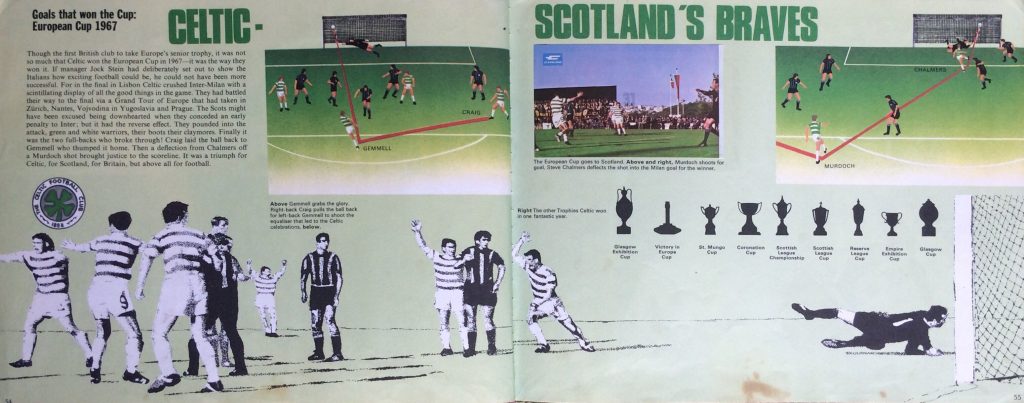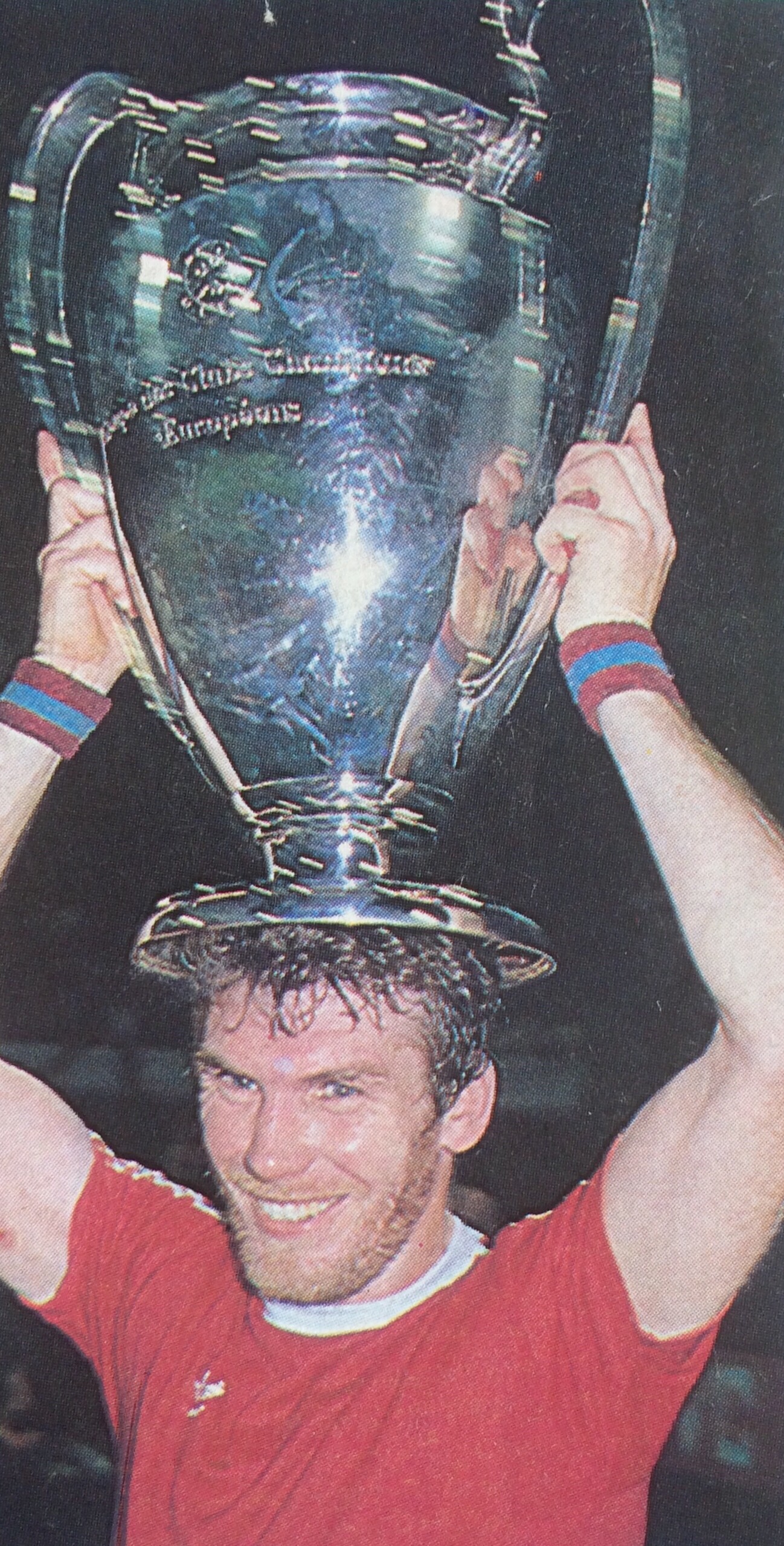English Winners of the European Cup
The first English winners of the European Cup were Manchester United in May 1968, when they defeated Portuguese Champions Benfica at Wembley. Their victory was followed by a run of six successes by English clubs in the late 1970s and early 80s.
The Wembley win was an emotional triumph for manager Matt Busby and players Bill Foulkes and Bobby Charlton, all survivors of the Munich air disaster of 1958, which had robbed English football and United of a generation of gifted footballers. That tragedy occurred after a European Cup tie against Red Star Belgrade and the victory ten years later was a vindication of Busby’s belief in the tournament.


R) Brian Kidd and Pat Crerand, Manchester United European Cup winners 1968
Below: Benfica v Manchester United, European Cup Final programme 1968

United’s manager since 1945 had been a strong advocate of competing in Europe despite strong opposition within the domestic game’s ruling bodies. “Challenges,” he said, “should be met, not avoided.” He had become the first manager to lead an English club into the European Cup in 1956-57, when United were beaten in the semi-finals by eventual winners Real Madrid, the club who dominated the competition’s early years.
In 1967-68, Real Madrid again visited Old Trafford for a semi-final tie settled by a goal from George Best. United’s comeback to draw 3-3 in the second leg, secured by a goal from Foulkes, took them to the final at Wembley. Their opponents were Benfica, twice European Cup winners at the start of the 60s. With Denis Law injured, Brian Kidd stepped in and scored the third goal on his 19th birthday. Two goals from Charlton, captaining the side, and another from Best secured the trophy after extra time.


Goalkeeper Jimmy Rimmer, an unused substitute at Wembley, started the 1982 final for Aston Villa. Injured after nine minutes of the win against Bayern Munich, Rimmer still became the first English player to collect a winners’ medal with two different clubs. United’s 1968 triumph followed Celtic’s historic victory the previous year, when the ‘Lions of Lisbon’ lifted the trophy after beating Inter Milan. Celtic returned to contest the 1970 final, which they lost to Feyenoord, but there have been no Scottish finalists since. English clubs had previously won the European Cup Winners’ Cup – firstly Tottenham in 1963, followed by West Ham two years later – but the Continent’s premier prize remained elusive.

Below: ‘United, They Beat Europe’ (Cleveland Golden Goals, 1972)

It was Gabriel Hanot, editor of the French daily sports paper L’Equipe, who had first championed the idea of a European club tournament. This was partly in response to the claim of Wolves manager Stan Cullis, after victories in friendly matches over Moscow Spartak and Honved in 1954, that his side were “the champions of the world.” The insular English football authorities were initially resistant to the concept, though Scottish clubs competed from the outset, with Hibernian reaching the semi-finals in the first season. The Football League even requested that Chelsea withdraw from that inaugural European Champion Clubs’ Cup in 1955. League Secretary Alan Hardaker feared his own competition would lose prestige and that English participation was “not in the best interests of the League”. Defying Hardaker, Busby insisted Manchester United enter the following year.
It soon became established for clubs to play in Europe alongside domestic competition; the influence of continental football on the English game accordingly grew throughout the 1960s. Manchester United’s Wembley success began a golden era for English clubs in Europe during the late 60s and early 70s. A number of sides lifted the Cup Winners’ Cup and Europe’s third competition, the Inter-City Fairs (later UEFA) Cup, including Arsenal, Chelsea, Leeds, Manchester City and Newcastle. The European Cup itself was then dominated by the great sides of Ajax (winners 1971 to ‘73) and Bayern Munich (1974-76). Bayern’s 1975 win over Leeds United still rankles in West Yorkshire, after controversial refereeing decisions helped the German side to victory.


Liverpool’s European Cup win in 1977 began the most successful era for the Football League champions. English clubs enjoyed six straight victories in the competition up until 1983, a record unmatched before or since. That run saw three trophies for Liverpool under Bob Paisley, two for Brian Clough’s Nottingham Forest and one for Aston Villa. From its inception, only league champions or winners of the Cup itself were admitted to the competition. Without a seeding system, much depended on the ‘luck of the draw’ – the first all-English tie in 1978 saw holders Liverpool and League champions Nottingham Forest meet in the opening round, with Forest progressing.


Below: ‘Clough’s Euro Champs’ (Shoot! magazine)

All of the six consecutive wins were achieved with all-British teams before the mass global movement of players, showcasing the strength of the First Division. Liverpool’s last triumph, a year before the Heysel Stadium tragedy of 1985 and subsequent ban on English clubs, saw them beat Italian champions Roma on their own ground in a penalty shoot-out which owed much to their Zimbabwean goalkeeper Bruce Grobbelaar. On their return to European competition in 1990 after the five-year post-Heysel ban, English clubs were further hampered by UEFA’s decision to designate Scottish, Welsh and Northern Irish players as ‘foreign’.


Below: ‘Villa Six-Hitters’ (Match Weekly)

The competition changed format in 1991 to include group stages, before being re-branded as the ‘Champions League’ the following year. From 1997, its expansion allowed teams to enter without actually being the winners of their domestic league. Once the Bosman ruling of 1995 removed the nationality restrictions, the spending power of the Premier League helped English sides to contest Europe’s top prize once more. In the Champions League era Liverpool added to their titles in 2005 and 2019, while also losing two finals. Chelsea enjoyed a first success in 2012, and Manchester United lifted the trophy for the first time since 1968 under Alex Ferguson in 1999 and 2008. Both Arsenal and Tottenham have been among the losing finalists.
Of the seven British European Cup/Champions League-winning Managers – four Englishmen and three Scots – six achieved this feat between the late 1960s and the early 1980s. Only Ferguson has won Europe’s most prestigious club competition in the decades since the formation of the Premier League transformed English football.

The Seven British European Cup/Champions League-winning Managers: Jock Stein (Celtic, 1967), Matt Busby (Manchester United, 1968), Bob Paisley (Liverpool, 1977, 1978, 1981), Brian Clough (Nottingham Forest, 1979 & 1980), Tony Barton (Aston Villa, 1982), Joe Fagan (Liverpool, 1984) and Alex Ferguson (Manchester United, 1999 & 2008).
& Runners-Up: Jock Stein (Celtic, 1970), Jimmy Armfield (Leeds, 1975), Bobby Houghton (Malmö, 1979), Joe Fagan (Liverpool, 1985), Terry Venables (Barcelona, 1986) and Alex Ferguson (Manchester United, 2009 & 2011).
The fortunes of English clubs in European competition is one of the topics in my book Before the Premier League: A History of the Football League’s Last Decades.

Below: ‘A Great European Match’, Manchester United 1968 (Kevin Keegan’s European Soccer Special, 1980)
